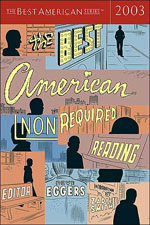[Transcribed discussion of “The Chameleon,” by David Grann, published in The New Yorker.
This article is about a European man named Frederic Bourdin. Bourdin has spent his life reinventing himself. Each time he does, he pretends to be an abused child. He’s taken on dozens of identities in fifteen countries. He speaks five languages. He’s a master at transforming his appearance—his face, his weight, his walk, his mannerisms—in order to pull the wool over everyone from schoolteachers to social workers. He has said, “I can become whatever I want.” This story focuses on his most daring ruse: In 1997, at the age of twenty-three, Bourdin stole the identity of a missing boy from Texas named Nicholas Barclay. He insinuated himself into Barclay’s bewildered family and was granted an American passport. Eventually the ploy was unraveled. Bourdin was arrested. Now, more than a decade later, he’s married and says he’s left the life of the imposter behind. But not even his mother believes him. She says that her son, a self-described professional liar, “will never change.”]
Philloria: This article grabbed me. It reminds me of something I’ve seen on TV. Like a crime show or a really good movie.
Bora: Don’t you think this guy needs help or something?
Will: Help for what? He’s not crazy. Every time they give him a psychiatric test he passes. He knows exactly what he’s doing. I don’t think it’s that easy to commit people these days.
Bora: Maybe he’s bipolar. Maybe his mental illness is just really subtle.
Will: I don’t think so. I think he knows what he’s doing. He does it for the thrill. I think it’s interesting that he ended up doing the one thing he said he wouldn’t do: He became a monster. When he took that boy’s identity from Texas, he blew it. He really led that family on. He even admits that was evil.
Joseph: Yeah, he blew it. The whole story about the boy’s family in Texas, how the family was kind of broken and messed up, that was really interesting too. In the last four or five pages the story really shifted its focus to that family. You kind of forget about Bourdin, because the story of Barclay’s family is even crazier.
[Nicholas’s mother struggled with drug abuse. His older brother was in and out of prison. The author suggests that Nicholas’s brother may have known what happened to the younger Barclay. But the older brother committed suicide shortly after Bourdin’s trick was found out.]
Will: I’m surprised the family didn’t press charges. They really got played around with. They just dropped it, and I think that’s because they might have known something about what happened to Nicholas. They didn’t want any more attention. The Barclay family really added another layer to this story. It was all so off the wall and bizarre. I think it’d be cool for everyone to read this article. It really engaged me.
Bora: This is good journalism. This reporter traveled all over the world for this story. He must have worked on this for a couple years. It’s hard to find good journalism like this.
Subscribe to:
Post Comments (Atom)









No comments:
Post a Comment